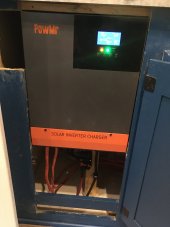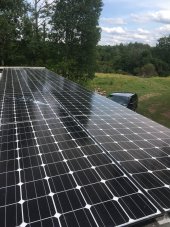My wife and I are thinking about building 1-2 off-grid cabins on our land for Airbnb use. We live right near the national forest and there are lots of ATV, and dirtbike trails and just lots of outdoor activities, also wineries. I was thinking either tiny house, yurt or maybe even park models. I know it would be fairly easy to do an off-grid solar system as that is exactly what I did with my house. So basically we are looking for inspiration. If you have an off-grid place show it off. Not just the solar setup but the home itself. What you did, what you might change, features you think are neat, ETC. Also if you do rent it out I would love to hear your thoughts on that too.
You are using an out of date browser. It may not display this or other websites correctly.
You should upgrade or use an alternative browser.
You should upgrade or use an alternative browser.
show us your off-grid cabin/shed/home setup
- Thread starter 8-ball
- Start date
I don’t have a house or cabin that is off grid but I do have a travel trailer that is off grid and most of the summer we use it like a cabin at a property 4 miles from our house that we lovingly refer to as “the camp” we have a family of 6 so our travel trailer is a 38’ long model The actual size is 35’ x8 interior space with 2 slides. It amounts to about 330 square feet all together. I feel my rig might be helpful as inspiration since the equipment I am using is more commonly use in stationary applications.
Solar array. I have twelve 270 watt solar panels raised 8” off of the roof and mount essentially flat. This gives us a nominal output of 3240 watts
Batteries. I have a limited budget and space so I only have one 100 ah lifepo4 battery ( four 12v 100 ah batteries in series)
Equipment. I use a 3500 watt powmr all in one solar inverter charger. It’s 120 volt only as the camper doesn’t have 240v capability. The AIO I have has a solar charge controller capable of handling 4400 watts of solar, an ac to dc charger that can charge the 48v battery bank at 40 amps per hour, a ups style transfer switch that enables us to have no power loss when the system is disconnected from “shore power”. The inverter is 3500 watts continuous with a 5000 watt surge capacity. The beauty of the AIO is less cost, easy setup and ups funk
Solar friendly upgrades. One upgrade was to switch all of our lights to led. We also removed our rooftop ac unit and replaced it with a mini split.
How it works for us. If it is not heavy overcast and we are out of the shade for a good part of the day. We can run ac 24/7 without using the generator. Once ac is out of the picture we use power however we want with no problem.
What could be different to be better. I can’t say I have any regrets with our system but in a different situation I would not carbon copy my present setup but custom build it for the specific application. if I had a bigger budget here is what I would do differently on my system I would use a different AIO mine has issues that I had to overcome with a special switch to make the solar charge controller work properly.
I would have 3x the battery. I would have a battery monitor.
Solar array. I have twelve 270 watt solar panels raised 8” off of the roof and mount essentially flat. This gives us a nominal output of 3240 watts
Batteries. I have a limited budget and space so I only have one 100 ah lifepo4 battery ( four 12v 100 ah batteries in series)
Equipment. I use a 3500 watt powmr all in one solar inverter charger. It’s 120 volt only as the camper doesn’t have 240v capability. The AIO I have has a solar charge controller capable of handling 4400 watts of solar, an ac to dc charger that can charge the 48v battery bank at 40 amps per hour, a ups style transfer switch that enables us to have no power loss when the system is disconnected from “shore power”. The inverter is 3500 watts continuous with a 5000 watt surge capacity. The beauty of the AIO is less cost, easy setup and ups funk
Solar friendly upgrades. One upgrade was to switch all of our lights to led. We also removed our rooftop ac unit and replaced it with a mini split.
How it works for us. If it is not heavy overcast and we are out of the shade for a good part of the day. We can run ac 24/7 without using the generator. Once ac is out of the picture we use power however we want with no problem.
What could be different to be better. I can’t say I have any regrets with our system but in a different situation I would not carbon copy my present setup but custom build it for the specific application. if I had a bigger budget here is what I would do differently on my system I would use a different AIO mine has issues that I had to overcome with a special switch to make the solar charge controller work properly.
I would have 3x the battery. I would have a battery monitor.
Attachments
chrisski
Solar Boondocker
- Joined
- Aug 14, 2020
- Messages
- 5,228
I would be hesitant to do an off grid Air bnb. Most people think conservation is a good idea but a single AC RV can easily use 20 kWh a day or as little as 500 wh if the AC is not used.
Difference between a $1000 system or a $40000 per cabin.
Difference between a $1000 system or a $40000 per cabin.
MichaelK
Solar Wizard
I would very much agree with Chrisski. I've found that the only person that really knows how to conserve electricity is the person that actually installed the system. Pretty much everyone else treats the system just like they were in their suburban home.
Sadly, that includes the wife. I have to monitor useage in real-time to make sure she is not draining the batteries dry.
So, don't be surprised that each and every BnB guest drains the batteries flat.
Sadly, that includes the wife. I have to monitor useage in real-time to make sure she is not draining the batteries dry.
So, don't be surprised that each and every BnB guest drains the batteries flat.
I live in a solar community in a tourist town in Baja Mexico. The folks who have tried the airbnb game with a solar home have been routinely kicked in the huevos. The visitors are on vacation, they couldn't care less about the solar system status. They run the system to death, then leave you bad reviews.
I was hoping to use something like a small mini split, hopefully using less energy. However now that you bring up the subject I think a yurt would be out because I am thinking now that I will want to insulate it very well. I live in Northern CA so I get plenty of sun and the heat really isn't bad except in summer. We don't even have AC in our main house. As soon as the sun goes down the temp drops and we open the windows but I am sure an Airbnb guest wouldn't do that so I was thinking AC was needed. Our previous house had a smart vent (uses outside air to cool the house only when the outside temp is below the thermostat set temp), it would pull air through the AC unit and filter it. Much like a whole house fan but I figured they probably draw way too much power. So wouldn't a mini split be ok? Also was planning on using propane for stove top and heating. LED lights and otherwise energy efficient appliances. Was hoping to stay around 300-400 sq ft. LiPO4 batteries would def be included in this build. We were thinking of using it as a guest house when our family visits from the east coast but when they are not here renting it out.I would be hesitant to do an off grid Air bnb. Most people think conservation is a good idea but a single AC RV can easily use 20 kWh a day or as little as 500 wh if the AC is not used.
Difference between a $1000 system or a $40000 per cabin.
Be sure to research your county’s rules for short term rentals. In some counties, they have very different requirements & permits between traditional dwelling units and alternative shelters (yurts, trailers, etc) and can levy hefty fines if found operating without a permit
Xhumeka
Off-Grid'er
If you do end up renting out a unit, make sure the solar equipment is in a locked cabinet, change all bluetooth passwords, and set the low voltage cut-off for your inverter and BMS very conservatively. Also install low amp breakers so your guests can't fire up their hair dryers, curling irons and coffee makers 
Mannfamilywoodworks
Solar Enthusiast
I personally would build out two 40’ shipping containers.
Mine isn’t that nice because it’s all materials I accumulated for free. It works for me for now.
Container delivered can cost about $4,000
6k inverter $1,300
5k solar $3,000
30kwh batteries and you should be fine. $9,000
Framing insulation and drywall $5,000 per container
Electrical -$750
Plumbing-750
Flooring -$1000
Cabinets-$4,000
Energy efficient Appliances- $3,000
Solar mini split -$3,000
I’ll come build them both for you. I have availability in October. I’m a traveling contractor.
%100 off grid turn key Airbnb
Mine isn’t that nice because it’s all materials I accumulated for free. It works for me for now.
Container delivered can cost about $4,000
6k inverter $1,300
5k solar $3,000
30kwh batteries and you should be fine. $9,000
Framing insulation and drywall $5,000 per container
Electrical -$750
Plumbing-750
Flooring -$1000
Cabinets-$4,000
Energy efficient Appliances- $3,000
Solar mini split -$3,000
I’ll come build them both for you. I have availability in October. I’m a traveling contractor.
%100 off grid turn key Airbnb
Attachments
-
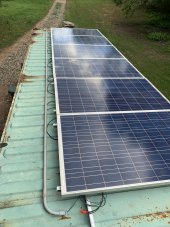 B065FEC5-9F8B-4CCC-84F2-EFC3E45B77CC.jpeg216.2 KB · Views: 28
B065FEC5-9F8B-4CCC-84F2-EFC3E45B77CC.jpeg216.2 KB · Views: 28 -
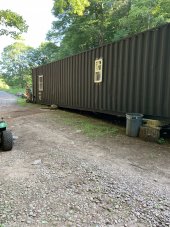 3CE7DC8F-42DF-406C-B21A-AC51ACEA4F36.jpeg289.3 KB · Views: 28
3CE7DC8F-42DF-406C-B21A-AC51ACEA4F36.jpeg289.3 KB · Views: 28 -
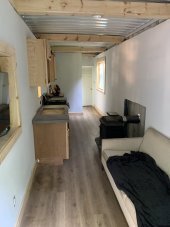 80714030-DB4B-4104-9601-D08A97F24025.jpeg99.8 KB · Views: 29
80714030-DB4B-4104-9601-D08A97F24025.jpeg99.8 KB · Views: 29 -
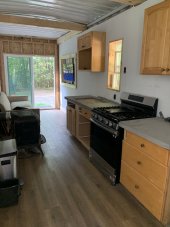 CDF731C5-B76B-471C-8324-C72D410EE148.jpeg127.1 KB · Views: 28
CDF731C5-B76B-471C-8324-C72D410EE148.jpeg127.1 KB · Views: 28 -
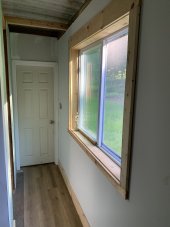 5EE4A6DF-C042-402E-8E0F-4503D383A8FA.jpeg107 KB · Views: 28
5EE4A6DF-C042-402E-8E0F-4503D383A8FA.jpeg107 KB · Views: 28
I agree with the locked cabinets , but low amp breakers restricting usage is a bad idea. The visitors expect to be able to use these items as they normally do. Having breakers trip only ensures you will be out there resetting them constantly , your guests will have a bad experience and leave reviews that reflect it.If you do end up renting out a unit, make sure the solar equipment is in a locked cabinet, change all bluetooth passwords, and set the low voltage cut-off for your inverter and BMS very conservatively. Also install low amp breakers so your guests can't fire up their hair dryers, curling irons and coffee makers
Xhumeka
Off-Grid'er
I agree with the locked cabinets , but low amp breakers restricting usage is a bad idea. The visitors expect to be able to use these items as they normally do. Having breakers trip only ensures you will be out there resetting them constantly , your guests will have a bad experience and leave reviews that reflect it.
Better having to flip breakers and "read the rules" than drain the batteries dry and have ZERO power. Running out of power completely would definitely ensure a bad experience and reviews to reflect it. As others have said, guests will not monitor their own usage accordingly.
12VoltInstalls
life passes by too quickly to not live in freedom
USB, lighting, RV water pump (if any), a couple 12V ciggy lighter outlets- no 120VAC outlets other than maybe a hardwired microwave and then no worries.
No expectations, no disappointment.
No expectations, no disappointment.
Weldman
Sunlight Welder
Almost ready to put the end caps on, here is my off grid pole barndominuim built it myself with a 54 year old backhoe, water level, grain bins and drill stem pipe. would of went with the shipping container stacking and such idea, but too expensive to get them here even if I did it myself. Grain bins were free, just cost 2 weeks of hotel rooms to tear them down.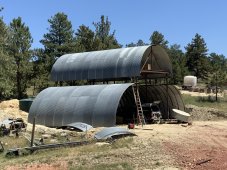

Similar threads
- Replies
- 27
- Views
- 1K
- Replies
- 1
- Views
- 224
- Replies
- 20
- Views
- 875



